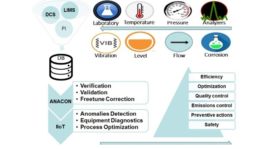
The term Industrial Internet of Things (IIoT) quickly became the leading buzzword to describe the technological trend in process industries. However, it’s not so easy to establish a clear business case to justify investments in this new technology. Especially for petroleum industries, where ROI approach becomes an indisputable requirement, it’s very important to measure the value derived from IIoT investments.
The worldwide refining industry has undergone a major transformation in the last decade due to changes in regulatory and market forces, such as fluctuating crude prices, tighter regulation on product quality and refinery emissions, shifting crude quality and fundamental changes in fuel demands. At present, refineries must be flexible enough to respond immediately to crude oil changes and deviations in product demands as a result of the changing global economy. The required flexibility in the management of a refinery can be achieved by direct monitoring of the physical properties and chemical composition of the product streams in each refinery unit.
To increase the margin, the refinery can (1) reduce feedstock costs, (2) decrease operating expenses and (3) increase product revenue. Targeting these main ROI criteria, Modcon launches novel solution, which is based on remote process analysis technology powered by big data IIoT functionality:
- Remote process analytics (RPA) provides a solution for safe and accurate measurement of physical properties and chemical composition by using a NIR process analyzer based system. The concept of this technology allows the analyzer to be connected by standard telecommunications fiber optics to a multiple set of different field units. These field units are installed at a distance of up to 3 km from the analyzer, close to the process. The measuring probes are free of electricity, without moving parts, and without any material able to generate static electricity.
- ANACON software centralizes on-line real time and historical analytical data from process analyzers and field instrumentation, establishing the connectivity between the multiple systems (DCS/PI/LIMS, etc.), based on OPC communication. To maintain the highest accuracy of the analytical data provided, constant verification and validation of analyzer/instrumentation readings against laboratory/reference results is maintained, which reduces the need for ongoing maintenance and fine-tune of the calibration model, without affecting the accuracy of parameter to be measured.
- Once physical properties and chemical composition data has been verified against laboratory results, ANACON can point on measuring devices, which requires attention, calibration and/or repair. Only after successful verification and validation of process data, ANACON performs big data analysis, looking for anomalies and their location in the process. Big data functionality includes multidimensional fusion and distribution of incoming data, abnormality of novel events detection, clustering, decision trees, linear, polynomial, logistic regression, escalation of novelty real-time analysis, etc.
The outcome of efficiency in this novel solution implementation is a noticeable reduction in operation costs, without affecting the production capacity or product quality. By that, the refinery increases its revenue, its profit and its economic growth. This enables the refinery to stand firm against any undesired influences which are caused by geopolitical and highly competitive economic environment. By combining process knowledge, remote analysis technologies and big data analytics power, ANACON-IIoT solution s driving unprecedented levels of efficiency, productivity, and performance.






